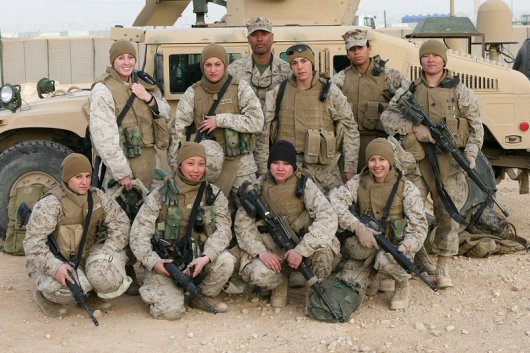
I remember back in 2008 or so when repeal of Don’t Ask Don’t Tell became imminent. I was a captain at the time, and more than a few of my civilian friends asked me, “How do you feel about serving with someone who’s gay? How do other military people feel about it?”
The truth was I already knew many military members who were gay, some even openly or not hiding it very well, and nobody cared. It’s true as a female officer in the Air Force I might’ve been surrounded by a more liberal demographic than, say, an Army private in an all-male platoon. But from my personal experience, the question of whether gay people serving openly would negatively affect the military’s effectiveness was on the same level as asking whether women and people of color would negatively affect the military. The answer was these people were already honorably serving, so of course not.
The mission of the military is demographics-agnostic. Certain jobs might require more physical ability, which may favor a bigger or more masculine physique, but even those jobs are rare given our near universal reliance on technology to do most of the heavy lifting, figuratively and literally. I haven’t met any trans people in the military yet because they’re still pretty rare. But I’m at a loss as to how someone’s gender identity would affect their duty performance. It wouldn’t, based on my 18 years of experience in the armed forces.
The only drawback from allowing previously marginalized people into the military has traditionally been the disruption caused by the in-group who disapproves for personal reasons. It’s interesting to me that the people who oppose letting trans Americans serve are convinced it will cause unrest and destroy unit cohesion…the irony lost on them that the complainers are the ones who cause problems when minority groups are integrated into the military, not the other way around. Blaming the out-group for that unrest is as rational as blaming a woman’s rape on her audacity to drink alcohol while on a date rather than on, say, the actual rapist.
It becomes harder and harder to recruit people every year as the divide between the military and civilian population grows, as the majority of Americans watch from afar, without really caring much or understanding what’s going on, while we fight and die in America’s conflicts. Patriotic citizens doing things like declaring they support the troops, or thanking soldiers for their service, or offering discounts at Denny’s, isn’t actual patriotism (though I’ll admit I won’t say no to 10% off a Grand Slam). Real patriotism is making an actual sacrifice for your country. Serving in the military is one way to do that. Hoisting an American flag in your front yard is not.
So if trans people want to serve, let them. Because we need them. I’m not afraid to speak for every person in the military when I say SO WHAT if someone was born male but wants to use the women’s bathroom or vice versa? NOBODY CARES. Eventually we all have to take a dump behind a bush during an exercise or deployment while our comrades-in-arms stand ten feet away.
But this issue isn’t really about military effectiveness. It’s about the soul of our nation. A country’s military is broadly reflective of that country’s demographics and values as a whole. This is especially true of the United States, where we take great pride in the power of our armed forces, even as we become more disconnected from them. Allowing trans people to serve in the military would mean accepting them as legitimate and valuable members of our society. The vast majority of military members recognize inclusivity as good for our national security—the more willing and able-bodied people we can get, the better. Those opposed choose to believe the tiny minority of military objecting for reasons of personal bias somehow represent the “silent” majority, because that minority aligns with their own biases. In that way, the issue is more than a general reflection of our country—it’s spot-on.
